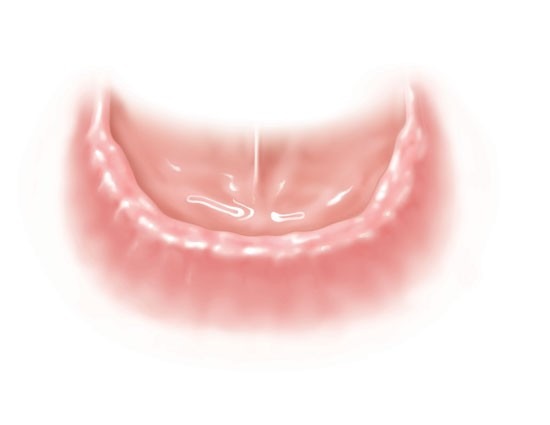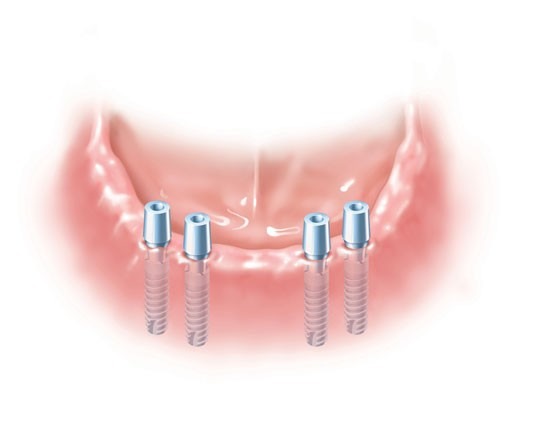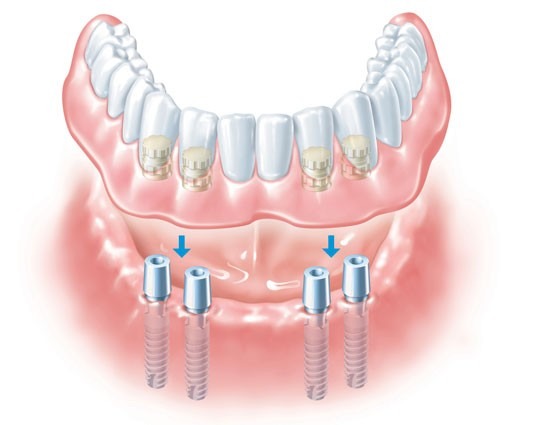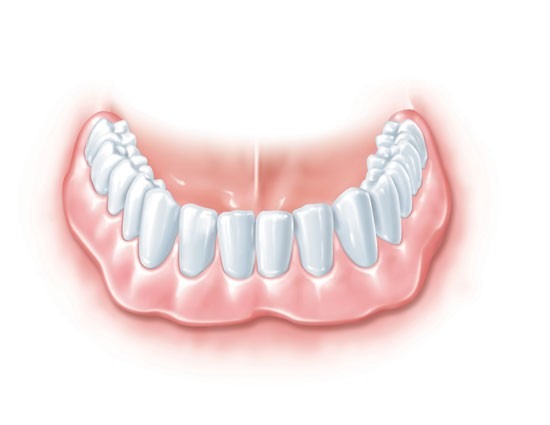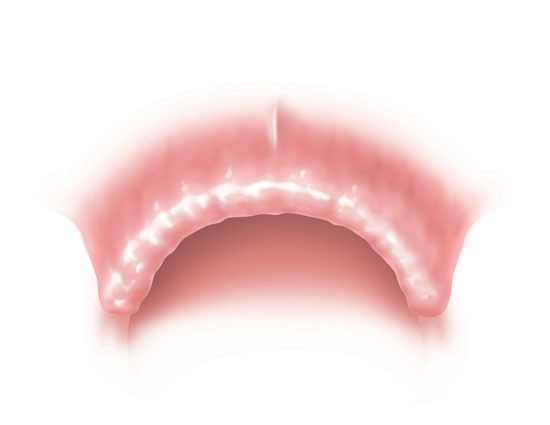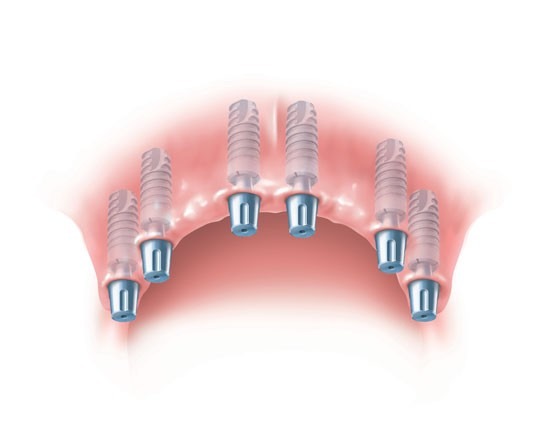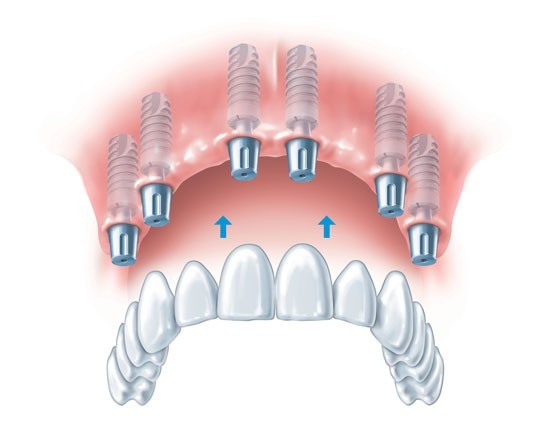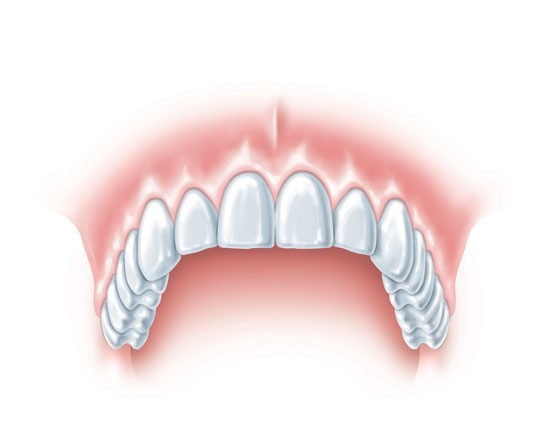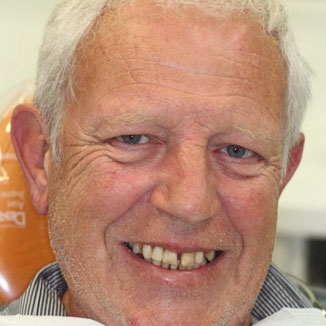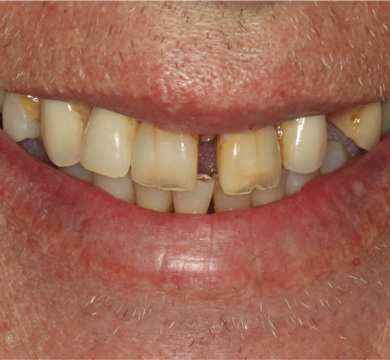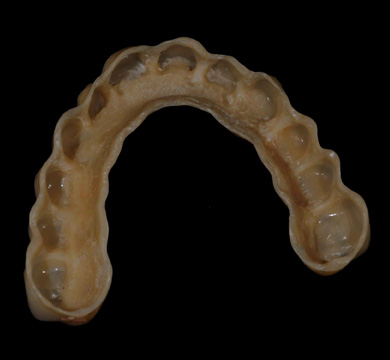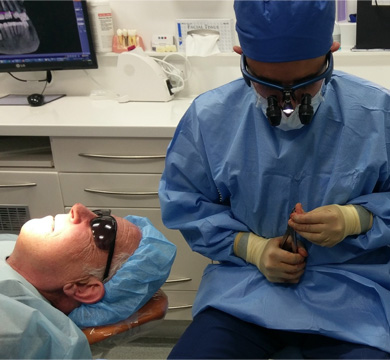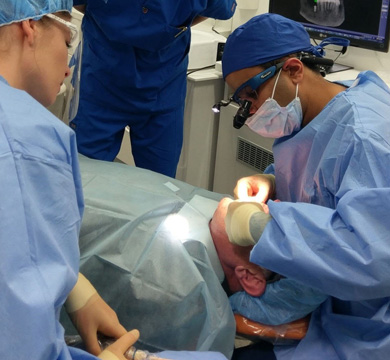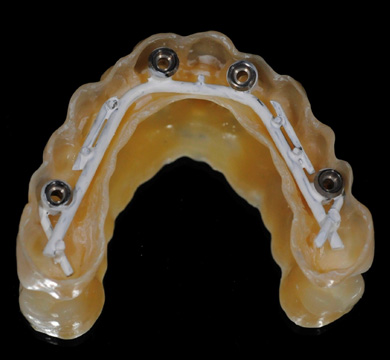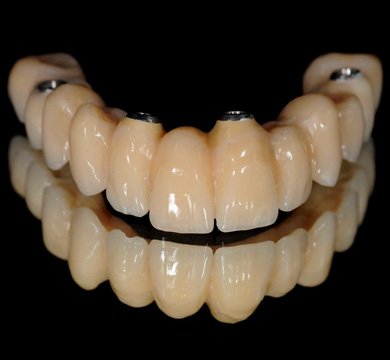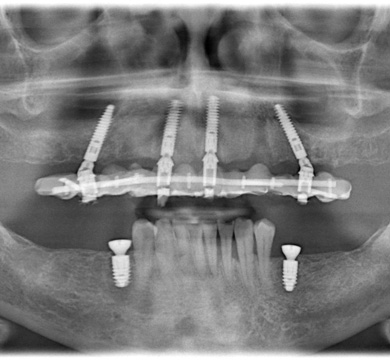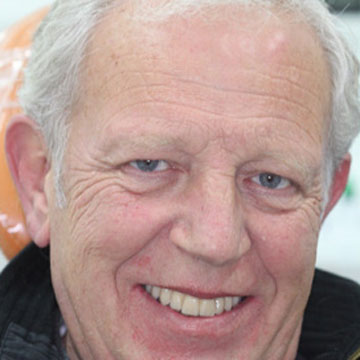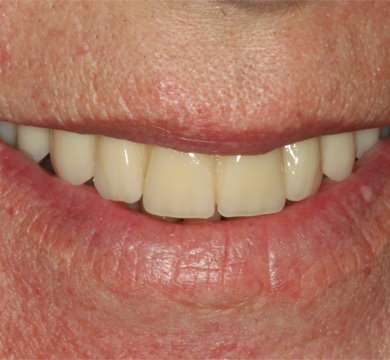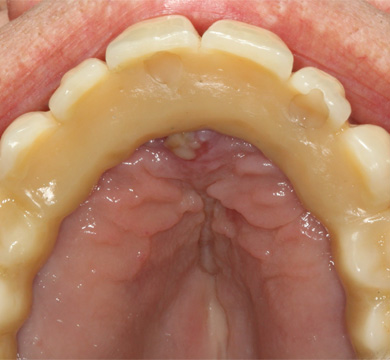Full Mouth Implants
Dental Implants are a great way of anchoring dentures firmly in place or even providing you back with a fixed set of teeth.
Research has proven that tooth loss can not only impair the ability to chew and digest whilst eating, but also have a negative psychological impact.
Treatments
FULL MOUTH IMPLANT OPTIONS
At The Staines Centre of Dental Excellence we have a range of techniques available to bring back your confidence whilst eating and smiling. We use the very latest techniques, equipment and highly trained clinicians to give the very best clinical outcomes.
ALL-ON-4 TECHNIQUE
The All-on-4 technique is a great way of providing the patient with a fixed denture or porcelain bridge connected to only 4 dental implants. This technique is very useful for those who have lost a significant amount of jaw bone through infection, gum disease or just the natural consequence of long term tooth loss.
The implants are placed in strategic angles to avoid certain anatomical structures and utilise the available bone. On the day of surgery a temporary bridge can be immediately fabricated and screwed onto the implants, and after 3-6 months the final bridge is constructed.
The technique is a very effective way of proving fixed teeth without the need for extensive bone grafting and placing more implants.
FAQs
Reduced bone loss
The bone tissue surrounding the root of your tooth is maintained by your body’s natural renewal process. However, if you loose a tooth, you will be left with a hole where your tooth root used to be and the bone around this area will slowly begin to disappear (atrophy) and may change the shape of your jaw. A dental implant placed in that area can actually stimulate bone growth and production, preventing loss of valuable bone structure. In some patients where bone loss is substantial a bone graft may be required before placing a dental implant. Bone loss is a problem for people who have dentures and as the shape of the jaw slowly changes the dentures need to be adjusted or re-made to fit the new shape of the jaw. Bone loss can also make a person look older since the area around the mouth can sag, as bone is lost.
Improved function
Once dental implants are fully integrated into your jaw they function just as well as your own natural teeth and you can eat the foods you want and speak with complete confidence. With dentures, eating hard foods such as an apple can be a problem, either the dentures come loose or patients cannot withstand the hard biting forces as they cause pain in the gums. Irritation or inflammation of the gums is a common problem amongst denture patients. Dentures HGH can be supported by implants or mini-implants which will improve function greatly enabling patients to eat the foods they want with complete confidence and not having to worry about bone loss and loose dentures falling out.
Improved dental hygiene
Unlike bridges and dentures, which require special cleaning instructions and extra attention, dental implants just need regular brushing, flossing and hygiene appointments just like your natural teeth.
No need to drill or remove any healthy tooth structure
When replacing missing teeth with dental bridges, the teeth adjacent to the gap need to be prepared and healthy tooth structure is removed to accommodate a crown or bridge abutment to fit over the top of the tooth. In the future if one of the supporting teeth is damaged the entire bridge restoration will also be compromised whereas with an implant the restoration is independent of any of your other teeth. By replacing lost teeth with an implant, no support is required of the adjacent teeth, and hence your natural teeth do not need to be prepared or altered in any way
Your smile looks great!
If done correctly a dental implant should be indistinguishable from your surrounding natural teeth. Dentures can come loose and look un-natural if they do not blend with your gums and some bridges and dentures have unsightly metal clasps to hold them in place. Dental implants provide a much better cosmetic and functional end result.
Traditionally an implant placed into your bone supports a single crown and this is know as a single tooth implant. However if you have several missing teeth you do not necessarily need an implant for every missing tooth, one implant can support several teeth via a bridge or a denture. The number of implants required depends on the volume and density of bone tissue available at each implant site. Often smaller sized, mini implants are used to secure dentures in place.
Dental Implants can be placed in patients of any age provided that they have sufficient quality and quality of bone tissue available. Most healthy individuals that maintain a good oral hygiene program are suitable candidates for dental implants.
Dental implants have been used for over 30 years to replace missing teeth and they can last a lifetime depending upon how you look after them. Like any other restoration your implant-supported teeth can still be damaged by trauma and affected by gum disease and poor oral hygiene.
Unfortunately, the standard of Implant treatment provided in the UK can vary substantially due to variation in standards between dental practices and their clinicians. Implant Dentistry is an extremely predictable and safe treatment for patients providing the operating clinician works to set protocols biased on evidence provided through research. It is extremely important an Implantologist has training deemed appropriate by the General Dental Council and suitable experience within the field.
IMPLANT RETAINED DENTURES
Implants can be used to secure removable dentures firmly in place. This technique only requires 2 implants in the lower jaw and a minimum of 4 implants in the upper jaw making it a very cost effective way of securing loose and uncomfortable dentures.
The technique can also be adapted to anchor dentures on the same day as the surgery, as typically a healing time of 3-6 months is required before implants are connected to the overlying denture.This is typically carried out in the lower jaw utilising 4 implants.
FIXED IMPLANT-SUPPORTED PORCELAIN BRIDGES
By far the best way to replace a full arch of missing teeth is by placing 6-8 implants which support fixed porcelain bridgework. This technique provides the most natural feeling result and is the gold standard treatment for full mouth rehabilitation. If there is adequate bone volume available this is an obvious choice. However, bone volume is often limited, and hence further bone grafting procedures are sometimes necessary prior to placing the implants.
Ian Henley’s Teeth In A Day Case
Your Local Dentist in Staines
Uncompromising general, cosmetic & implant dentistry
We pride ourselves on the highest standard of patient care and aim to provide our patients with the very best that dentistry has to offer in an informal, and above all caring manner. The Dentists at our practice have been chosen on the basis of their unquestionable desire to achieve the very best for their patients and thus, they have participated heavily in post graduate level education to achieve this fundamental goal.
Practice Opening Hours
| Monday | 8:00 – 19:00 |
| Tuesday | 8:00 – 17:30 |
| Wednesday | 8:00 – 19:00 |
| Thursday | 8:00 – 17:30 |
| Friday | 8:00 – 17:00 |
| Saturday | 8:30 – 12:00 |
| Sunday | CLOSED |

